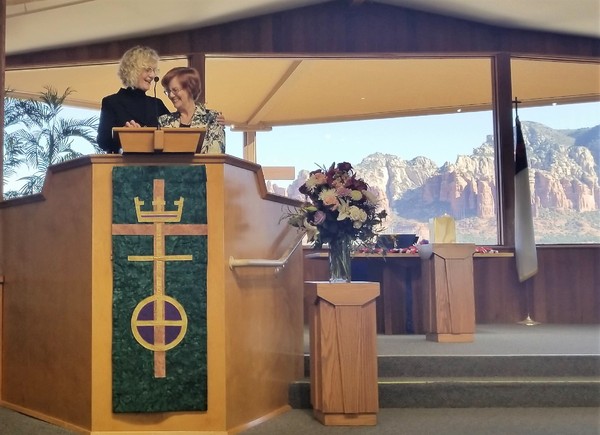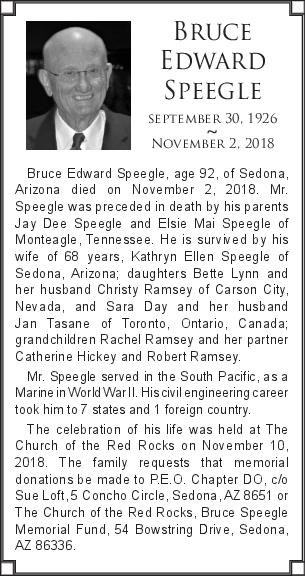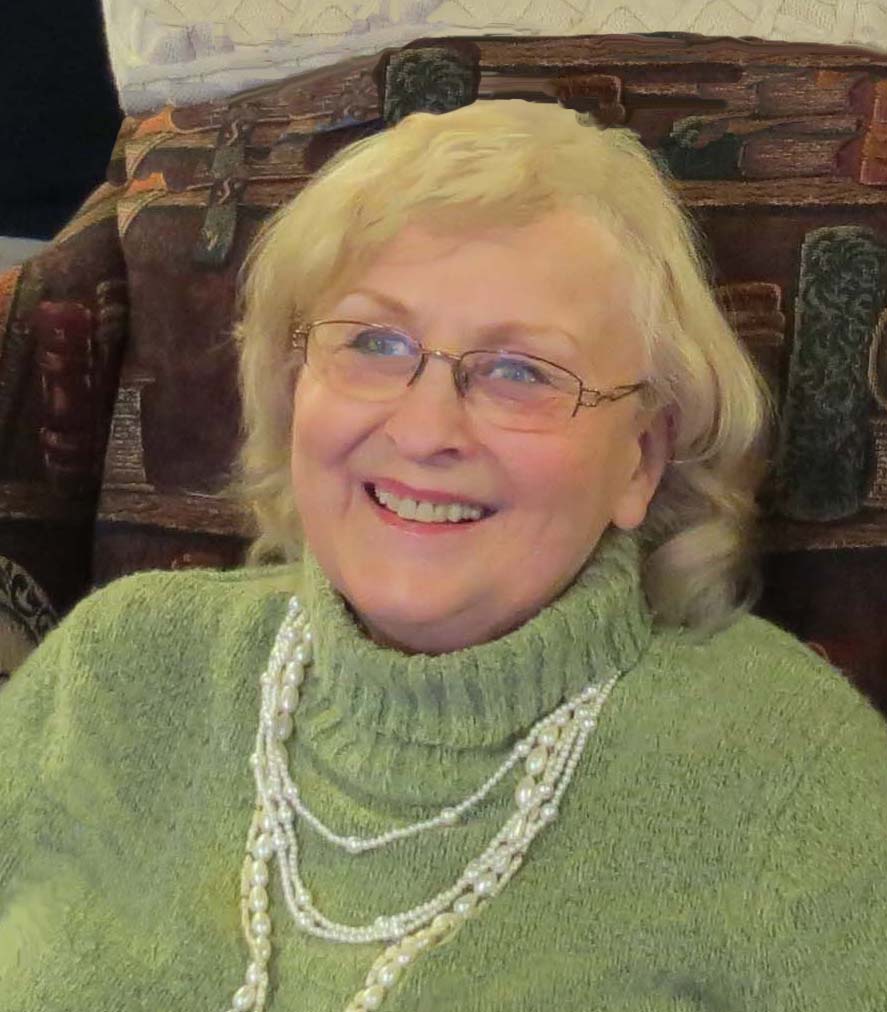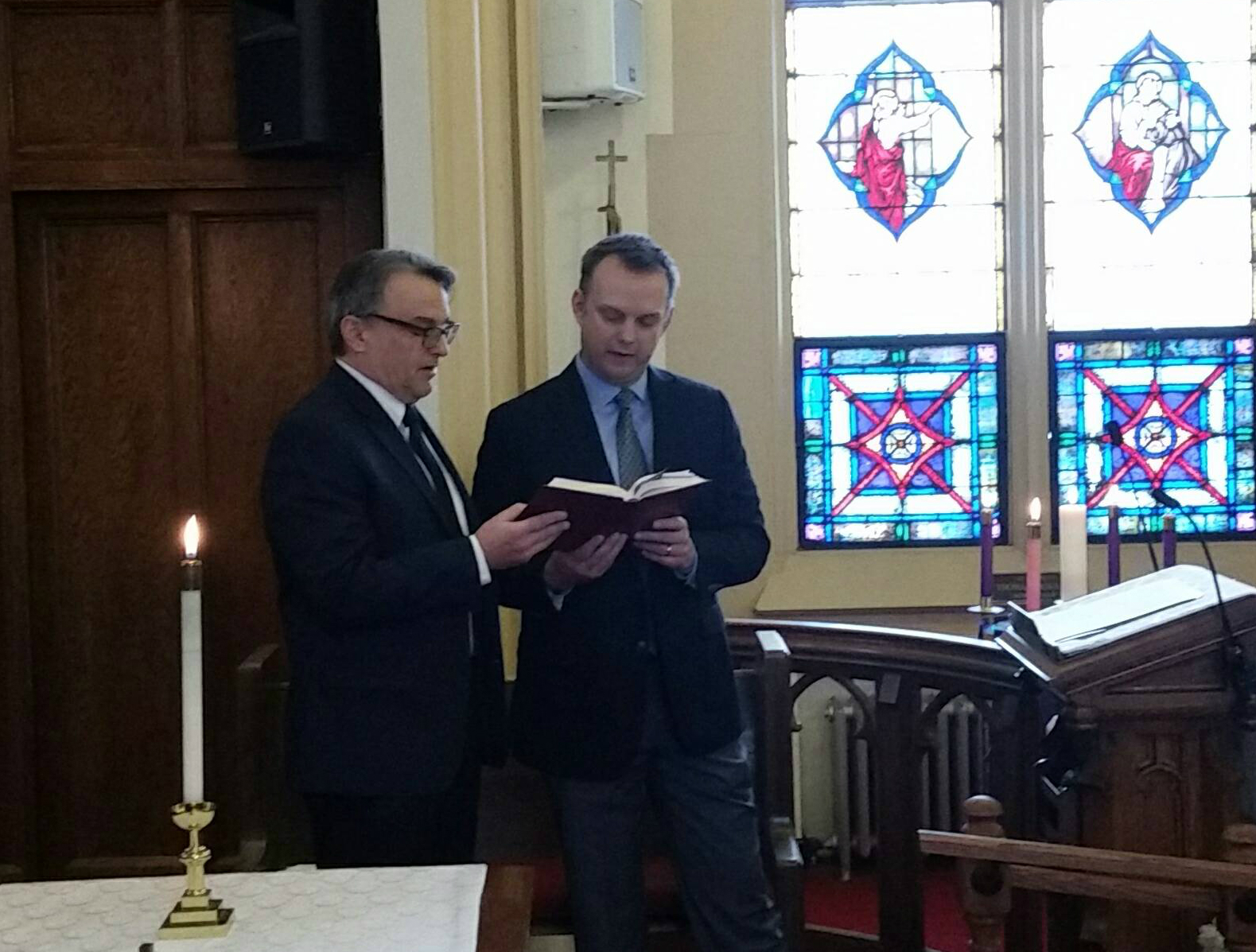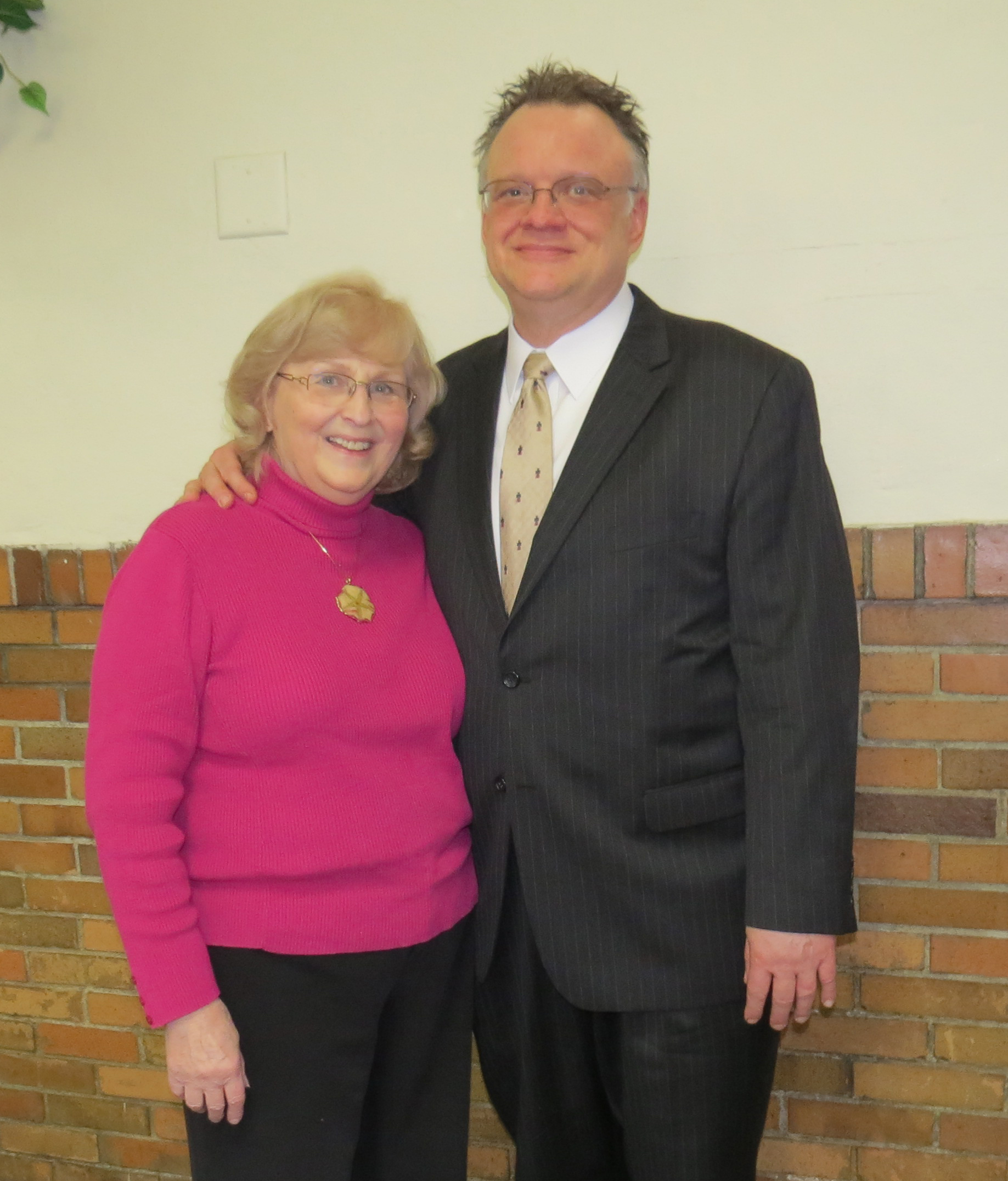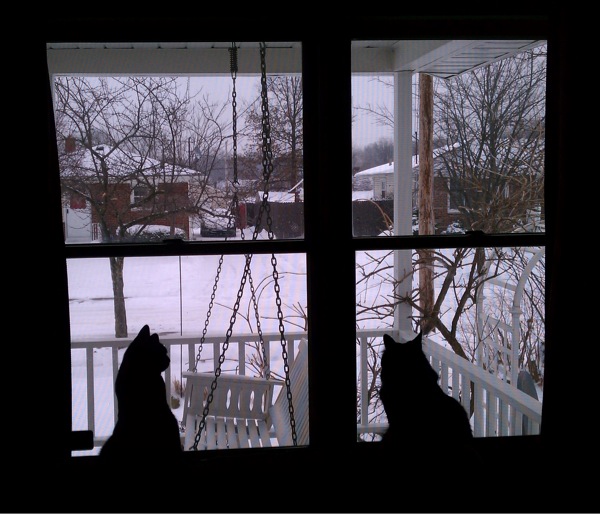 Mary Lu Ramsey (seated) and Christy Ramsey July 4, 2015 What if there was a parade and everyone joined in? Or if there was a march and everyone brought lawn chairs to watch instead of walk?
Mary Lu Ramsey (seated) and Christy Ramsey July 4, 2015 What if there was a parade and everyone joined in? Or if there was a march and everyone brought lawn chairs to watch instead of walk?
Some people parade their faith, some use faith as a way of life, a path to follow, a journey to take: marching orders.
In Parades and Marches, we consider a parade in the Bible in from 2 Samuel 6: 1-5, 12b-23 and the only love story of its kind in the entire Bible.
This is a recording and transcript from the worship service at Spanish Springs Presbyterian Church on July 19, 2015.
Audio recording: Marches and Parades
Transcript by edigitialtranscription.com
You only have to worry about one verse for today. One verse: 2 Samuel 6:16. Did you hear it? The ark of the Lord came into the city of David. And Michal, the daughter of Saul, looked out into the window and saw King David leaping and dancing before the Lord, and she despised him in her heart.
What’s another title of Michal? Anybody know? Queen of Israel? How about David’s wife? Did you hear, every time he brought up Michal, it wasn’t “wife of David, Queen Michal,” but “daughter of Saul.” Not David’s wife. And there’s a story there.
But first let’s talk about my mother. You know, it’s great to be a visiting minister. I come tell family stories. My family’s not here. That’s cool. What I say goes; right? All right. So my mom, I went to visit my mom over July 4th. That seems to be a tradition with me. And we were down there. I would come see her.
For over 40 years there’s been a celebration on July 4th on my block. When I was a wee lad 40 years ago, I went around and got the petition to shut down the street, close off the street for a block party. And we had games and competition, a dramatic reading of the Declaration of Independence. And we had a parade of decorated bicycles and wagons and things, a parade. And I was in that parade. Forty years later – and my mom and dad were movers and shakers and that. And 40 years later now I’m all grown up. But my mom still goes to that parade.
She doesn’t do as much as she used to. I mean, she’s in the, well, you know, the ripe ages of 70, up toward the 80. And she’s on continuous oxygen. She gets tired just thinking about getting up. And she’s got a scooter that she scoots around with. But even that this year, she was saying – and she was in the parade last year, and she won. And she felt so bad because there was little kids with wagons that were crying, and she had a trophy. She goes, I really wanted to be in a noncompetitive category. And she said, “I don’t think I can be in the parade.” And she was so sad, she said, you know, 40 years. And she goes, “I can’t be in the parade. I can’t take it. I can’t – I don’t think I can get around the block, even in the scooter. I’m afraid I [indiscernible], I’d have to rest.”
And my son, my son, he’s not an overachiever. No one would accuse him of that. And I could tell you – and I’ll tell you, maybe some other time tell you stories about my son. But, you know, he has – I want to tell you about my son. I wish I had half his – I want his empathy, I guess it is. That man can figure out the perfect thing you need. What you need, he’ll know. You may not know, but my son Robert will know, and he’ll tell you. He is perfect in that way. Lady, he is available, I mean, still, and he’s a good catch. And so, you know, my mom, and I didn’t know what to say. And to his grandma he says, “You know, Grandma, you know, Grandma, that parade, you know, everybody goes – the kids and the parents and grandparents. And nobody watches it. Everybody’s parading. It’s not really a parade unless someone watches. They really don’t need another float. What they need is spectators.” And my mom just lit up. She was so happy. “Well, I could do that.”
And she got all dressed up, got her red, white, and blue stockings on that she breaks out every July 4th, sat out in front of the yard going, “Whoo, whoo, whoo,” you know, waved the flag and waved at all the kids, had a great time. And then my wife – I was under assignment to take lots of pictures, so I was running around taking pictures – my wife got her to move down to the end of the block, where she could get them on the way back. So she was spectator times two. She had a great time.
And my son said something that inspired the sermon today. He said, you know, the guy gives what you need. Thanks, Robert. He says, “You know, it’s not so much a parade as it is a march.” It’s not so much a parade as it is a march because everybody goes. No one watches.
And I got to thinking about that. And I’m thinking, wow, that applies to so many things. The different between a parade and a march is whether everybody’s march moving or everybody’s watching.
I mean, we’ve got a whole lot of parade Christians, spectators. You know? They don’t like to do Christianity, but they like to watch. Oh, I don’t really do that, I’m not into that, but I like to watch it. You know. Are there any kids here? They all left. Oh, okay. Yeah. So parade and march. And you look at Michal, who is a tragic figure and a very important figure in the Bible. And I’ll tell you why. She’s very special. She’s the only person in the Bible that has this. That’s coming up. Stay tuned.
Michal and David. Now, is it a march or a parade, bringing the Ark of the Covenant in Jerusalem? Well, let’s take a look. 30,000 men. Now, does that mean just the men went out? I don’t know. They had a really bad habit of just counting men in the Bible, even in the New Testament. Even if there was a couple thousand women with them, oh, they don’t count, unh-unh, you know, they were like that. Sorry. So I’m thinking there might have been a huge horde of people. It’s always pretty much a march. And there was dancing and singing.
But there was at least one spectator. Just look where Michal was. And you only get a couple words in the Bible to talk about Michal, and the Bible writers say “looking out her window.” Michal was not in the parade. She was not in the march. She was a spectator, judging the display. That’s one of the things about a parade; isn’t it? Difference between a parade and a march? March, everybody’s there. Everybody’s going. Everybody’s going. Dum da dum da dum. Parade, there’s all sorts of people. There’s floats. There’s people walking. And then there’s judges. Aren’t there judges in a parade? Yeah, I’ve been a parade judge. There’s a reviewing stand of dignitaries, you know. There’s traffic cops hanging around.
You know, the more I hear about a parade, the more I’m thinking about church. Sounds more and more like church to me. That’s another difference about a parade. Parade is all about spectacle and about look at me, look at me. Isn’t that the idea of the parade? It’s the greatest spectacle, the wonderful float, and look at me, and show me all about these things. And but a march, a march is not about showing us, not about individuality, not about standing up, not about best than everybody else, not about – in fact, most marches, everybody’s trying to look the same. It’s like they have uniforms or something. And usually you see marching people, they’re all, de de do, all agree, we’re all looking like don’t look at us. We’re on the way here. We’re all marching. A march is about us, not about who’s the best one of us, but all of us moving.
A parade and a march, there’s a difference between a parade and a march in that have you ever noticed that a parade goes in a circle? Have you ever been in a parade that went anywhere? Parades just go around in a circle. The best parades. Now, sometimes parade goes one end of town to the other and strands you down there. And then you have this, like, strange – you ever been to Nevada Day parade? There’s a strange reverse parade. Have you seen this? That the parade’s here in front of you, but the parade from like an hour ago is going behind you. Yeah, we’re walking back to our car, yeah, got to go this way. And you’re thinking, I just saw those guys there.
Yeah. Parades go nowhere. Marches go somewhere. Marches have a destination. We’re marching to Zion. We’re marching to this place. We’re on a forced march to this place. It has a destination. It is definitely not in a circle. Marches go somewhere. Do I have to point out a church thing? Are you going somewhere? Are you parading, or are you marching?
And here’s something that’s kind of subtle, but as soon as you think about it, you think about it, you know. Parades, other people, a few people put in a whole lot of time. Have you seen those things in Nevada Day? Some of those things they build up? I’m thinking you probably are going to start tomorrow on next year, to get done in time, all of the stuff you did in the floats and the buildings and the things that you’ve got going here. I go, well, you put a lot of time into that. Oh, yeah.
And then other people watch. Not much required of parade watchers, of spectators. You just pretty much have to stand there, to get there early, get a chair, sit, you know. That’s all you’ve got to do. And you don’t have to stay for the whole thing. You can leave early. No one makes faces at you like they do in church. You know, but at marches there is no – everybody’s in. Everybody’s all in. Everybody’s carrying something. Everybody’s working. Everybody’s walking. It’s not like a couple people work really hard, and the rest of us say, oh, good job. It’s everybody is involved in a march.
The very words, the very words “parade” and – I did not know this till I started working on this, but the very words “parade” and “march,” parade, the root of parade is to stand. I would never know that. It is to stand and show. Movement is not in the word “parade.” Now, “march,” strangely enough, comes to us from the word that also gives us “trample.” Trample. The same root goes back in there. So when I think about, when I hear about “march,” I’m thinking about he has, what? When you hear “trample,” what do you hear?
Grapes of wrath. He has trampled out the vineyards where the grapes of wrath are stored, a great image from Revelation. So marching and trampling is very much in the Bible as something that Christians do. Marching, trampling out the vineyards. It’s a destination. It’s a duty. It’s something to do.
So how can you do it? I’m working on a little thing, so I’ve got to keep looking here. I’m trying to actually have a structure and list things because, God bless you, my wife’s one of these – she’s not here, so I can talk about her. And she knows this happens, so it’s her fault. But, you know, there’s some people, and we need them, we need them bad, I need these people. They make lists? Anybody? List people? You don’t have to, you know, you can – I see you pointing. Yeah, people make lists and do things. I don’t do that. But I try every now and then to visit that land. It’s a strange land. I usually need a guide to tell me where things are. And no, you want bullet points, not numbers.
Anyhow, so I’m making a list. So I’m making a list. Here’s my list. This is for you list people. I’m trying to speak a different language here. It’s almost like Greek or Hebrew, but here we are. List. How can you be a marcher instead of a parader? Well, Christy, what can we do about this? How do we not be like Michal, and get out and dance with David?
Now, Michal, I want to say some good things about Michal. I’m not down on her. I’m a big fan of Michal, you know. And she does have a point, you know. We don’t know exactly what a linen ephod is. If you want to get some people wound up, you know, say this is what it is. Oh, everybody start yelling at you. But pretty much they sort of move around. It’s an apron. So we’re thinking he was just wearing just an apron. And you know that scripture, that one verse I said, 16, it definitely made point to say, not just dancing – which is plenty. I don’t need anything else. Dancing’s fine. Oh, no. It made a point to say “leaping and dancing,” as if – do I have to draw you a picture of what was happening out there? You know. There was leaping involved; okay? All right? He had a ephod. We told you that. The leaping, okay. Enough said. This is a family Bible.
You know, so Michal, you know, I think had grounds to be a little mad at the husband. I’m pretty expert on this, too, grounds for being mad at a husband. Oh, but the list. Yeah, told you I’m horrible at lists. Here we go. Lists. All right. So the list. How can we be a marcher instead of a parader? One. One. Join in. Simple. Join in. Don’t be a spectator. Don’t watch out the window, being like in the reviewing stand, judging the floats that go by in the Christian parade. Get out there and join in. When you see trouble, when you see opportunity to get out there and dance however, whatever you can do, get out and do that.
How can you do that? There’s all sorts of opportunities. I mean, I kind of think that a church exists so that people can join into the Christian march. Basically that’s what we’re about. It doesn’t save us. It doesn’t get us attendance points in heaven. It doesn’t check us off community service in the heavenly kingdom. What it is, is for us to join in the march, to find some mission, some way that we can be together to do great things that we could probably not do alone. So join in the march.
Now, you’re saying, I am not really a church person. I just accidentally wandered in here. I thought it was an office supply shop, you know, it’s in the plaza, and then I was too embarrassed. And the coffee. So if you’re not into that, you can do some nonprofit things, too. You can get out and do God’s work at nonprofits. You can maybe even do it in profits. But nonprofits usually have a mission, a march, and they’re usually looking for someone. And a lot of them are church affiliated. You could probably hear about them in church here.
I do ComputerCorps in Carson City. And they’re kind of churchy. They take community service people and people trying to kick drugs and give them a chance. You know, we’re going to give you a chance. Now, a lot of them steal from us, and we’ve got to fire them in sadness. But they keep trying. They keep trying to give them – they keep trying to give them a chance. There’s some people that never had a job in their life because they’re not the smartest person in the class, and they come to ComputerCorps, and we give them a job.
And we’ve got one guy that sweeps the floors, and he does a really good job, and we really encourage him; you know? And he’s doing better. And some people go from there and go, actually, they can get a job because they know how to show up. They know how to punch in and out of the time clock. They know how to be responsible. They know how to do that. And I think that’s God’s work. They’re run by volunteers. You can find a nonprofit to join in. But that’s the key. Join in. Don’t watch. Join the march. Don’t be the watcher.
Next on the list, have a destination. Find somewhere to go. Don’t go around and around and around and around in circles. Okay, I didn’t say committee meetings, but I know you’re thinking it. Okay? I know. I know about that. Don’t go around and around and around in circles. Don’t let your only church service be committee meetings. God knows we need those. Administration’s one of the spiritual gifts, hallelujah, I’m testifying. But don’t go around and around in circles. Have a destination.
What are we here for? What are we doing? What in God’s name are we doing, for heaven’s sake? That should be a question every day. What in God’s name are you doing, for heaven’s sake? If you can answer that question, we want to be here then, we want to be there, we want to make sure that these – we want to make an outreach to the high school. I don’t know what you’re doing. But have somewhere to go. Otherwise you’re just parading in a circle, showing people things and saying “We’re on our way here. This is where we’re going.” Have a destination.
Oh. Habitat for Humanity. Anybody heard of Habitat for Humanity? I heard the founder speak at the General Assembly Presbyterian Church, very moving, very challenging. He did not let – he put our feet to the fire because he started reading off, you know, the Methodists have built 1,024 houses. I see the Presbyterians are at 800. Oh, boy. People are looking around at that one. But he had an inspirational speech. And one of the things I think is so good, they have a destination. They have a place they’re going. They’re marching forward.
You know what, you know what they say about Habitat for Humanity? They say this about this. This is what they’re doing. This is where they’re going. No more shacks. That’s where they’re going. Where are you going? We’re going to a world where no one lives in a shack. That’s what we’re doing. How are you doing? I can measure my march. I know how close I am by how many people still do not have decent, affordable housing. No more shacks. Have a destination.
List people, another one. Three. For that I should do numbers. Three. No, three, always we, not me. It’s not about who’s the best. It’s not about who’s got the flashiest clothes. You know what, you know, I don’t know if I told you this. Oh, I can tell you. But I work at Best Buy, at Geek Squad. And everybody there, including, like, my boss and my boss’s boss, are the age of my kids. And I try to behave. Lord, Lord knows I try. But sometimes my boss says, he says, “Well, we got – this year is about humble and integrity, and I graded you the highest on there. I think you’re very humble.” I go, “Oh, no, no. I’m not humble at all.” He didn’t get it. He started arguing with me, “Oh, no, I think you’re really humble.” And I go, “No, no. I’m not humble.” (Hand sweeping over head.)
If you do not care who gets the credit, there’s no limit to what you can do. The Reagans both said that, Lincoln, Truman. The first one we found is 1922, a guy with an impossible-to-pronounce name, Montague, Charles Edward, said there’s no limit to what one can do as long as one does not care a straw who gets the credit for it. So it’s always we, not me, if you’re marching. If it’s me, you’re on parade. You’re up there saying, “Look at me, look at me, aren’t I the best?”
Four. I remembered the number. Four. Here’s the thing. Put in the time. Remember this is the one where you just watch, and there’s not much commitment or work needs required if you’re just watching a parade. In a march, you’ve got to get a pack on. You’ve got to get ready with your boots. You’ve got to train. You’ve got to move. You’ve got to put out the time. And you’re there for the whole time, committed time.
And here’s the difficult part, you know, and people get mad about this sometimes, but I want you to consider this. Pay for your own faith. Don’t make other people pay. Right? Don’t say, “I have this deeply held, passionate, important, core belief, and I want you to do it for me.”
Do we have a lot of that? Oh, I get fired up about it. I’m still fired up about, ooh, boy, that was several years, I don’t know, back in the day. A friend of mine was in the Lutheran Church, ELCA, you know, the ones that talk to us, those guys. And he was – he had a bit of land, and he was going to build a church on it. Whoo, hah, good, all right. He was going to build a church. He was raising his money. And they’re all raise the church, raise the money,
The church was meeting at the high school. And he comes to – we had a weekly meeting of the ministers, and we, oh, we did a lot of things. About a whole ‘nother sermon. So we talked, he says, he goes, “Hey, we’ve got a great opportunity. Looks like somebody wants to buy our land that we have, and they’re going to pay us four times what we paid for it. They’re going to pay us four times what we paid for it. Stewardship drive’s done. We’re ready, we can build, we’ve got other land that we’ve got our eye on. We’re going to buy it and [indiscernible].” You know, we’re all dancing around, “Hallelujah, God is great, God is great, whoo, whoo, whoo, hey, hey, stewardship drive’s done.” Like that. One check. Oh, yes, Lord.
Walmart wanted to buy it. In a small town in Ohio. That minister got death threats, threatening him and his family if he sold to Walmart. I was livid. Still mad. It’s been 10 years, 15. I was livid. And they were talking about his Christianity and talking about his family.
I said, “Hey, guys, okay, I understand your passion. I understand your arguments. And you don’t like Walmart, fine. Well, then, you all take up an offering, and you all buy that land from him and match Walmart’s price. Is it important to you? Well, then, pay up. Don’t you dare tell those Christians they have to pay for your beliefs. Not the way we roll here. It’s not the way Christians roll. Take up your cross. It doesn’t say give your cross to someone else to take up.”
This is the difference between a parade and a marcher, a marcher pays for their own faith. A marcher puts on the boots and spends the time and puts on the pack and does the walk and doesn’t say, oh, yeah, very good, you all do that for me. They didn’t come up with the money, but they shut up. Well, at least to me they didn’t say anything. So [indiscernible], whatever works.
That was four; right? Who’s keeping track? Anybody? I should have assigned someone. Okay. Thanks, five. I think we’re at five. Four? Oh, you want more? Dinner’s burning. I mean, we’re going to get – a lot of people are going to get to the restaurant.
Five, five. I think I already talked about this some, about – and that’s the problem with the list. I move around it. Show, you know, the difference between being stopped, parade rest. You know, when you’re watching a parade, you’re not moving. And marching, you’re doing nothing but moving. So check yourself. There’s been a study that men – now, women, thank you, women, they keep learning and growing in faith all their lives. The last study I saw saying, us men, we kind of stop right about Sunday school, fifth grade somewhere. And then we just cruise. “Honey, you all go to that class. I will stay home.”
You know what I love about – I love the Grads and Dads in June. And one of the things I love about it is to take a look at whether it’s graduation or commencement. There is no graduation in a church. There are commencements, but when you start something. You’re going to start another version, another chapter, another leg of our journey, of your spiritual journey. It’s never graduation. It’s always commencement. So you want to be in the march instead of being outside, standing in the parade, be that way.
I could add another one, too, you know. Don’t be judge-y. You know? Michal up there, it’s hard not to be judge-y if you’re watching the parade. And it’s almost impossible to be judge-y if you’re in it. People say, “Well, how did the sermon go today?” I go, “I don’t know, I wasn’t listening. I just gave it. I don’t know. I had a good time. I don’t know.” You can’t be judge-y if you’re doing it. If you’re watching, you can hardly help but doing it. And that’s a bonus one right there.
So always, one of the things I pray regularly is let me have an attitude of gratitude and not grievance, being grateful instead of being complaining. And if you’re working on something, you’re less likely to complain than you are if you’re watching something. And if you’re working on something, you’re probably going to be more like you want it than if you’re just watching it. That’s almost random, if it’s going to come out right.
Okay. Now, if you’re like me, you’re going, oh, that’s a lot to remember. I don’t – I don’t – he had an extra one there, and then he backed up, and I didn’t take notes, and I hope there’s not a quiz. Oh. Did you – you ever seen those bulletins where they have, you know, sermon notes? That’s a lot of pressure for me and you, so.
What if you’re like me, and you’re saying, you know, the list is fine, you know, but can we have something else? And I got something else. Remember I told you something else was coming. You know, for all this story and the strangeness here, Michal, David, and a window, this isn’t the first time that Michal, David, and a window is in the Bible. Who and what? 2 Samuel we see Michal, David, and a window. But we also see it in that 1 Samuel that I talked about, 1 Samuel 19, verses 11 and 12, a very different scene, a very different outcome.
Because, you see, the one thing that the Bible says about Michal that it says about no other woman in the Bible – you can go through the whole Bible, and the Bible never says this about a woman. And it’s very important. This is the only time, and it’s with Michal only. Only Michal in the Bible does it say that a woman loved a man. Michal loved David. Remember that old patriarchal kind of man-centered thing I was talking about earlier? Maybe that’s a little bit about that, you know, that a woman’s love wasn’t that important back then. It was property values and dynasties. And poor Michal was married to David twice. She was passed around as a political pawn in treaties and power things.
But there was a time in 1 Samuel where the Bible, even the Bible takes notice. And Michal loved David. She wasn’t always up in that window, despising him. The last time they were at a window, I wonder, I wonder if she was thinking of that time that she looked out that window alone at her husband the king. That last time was before he was king, when her father was king, when she was the prize and the plum and the desired of all. When she was powerful, she and David were together as husband and wife because Michal loved David.
And Saul had enough of David. He was way too good. And Saul sent people to kill him. “Go, and when he leaves Michal in the morning, kill him.” Michal knew this and warned David at the risk of her position and, yes, even her life, said to David, saying, “If you do not leave right now, you will be dead in the morning.” And going against her father, and her family, and maybe even her country, if you looked at it, she warned the one she loved to go, and lowered him down out of the window to safety. And she didn’t stop there, either. Not just warning David, not just letting him out the window to safety, she made a dummy on the bed and put goat’s hair, hair there, and told his father, the assassins waiting outside in the morning, going,
“Oh, he’s sick in bed. He’s not coming out. He’s sick in bed.”
And when they finally got wise to that and came up, and they said, well, look, he’s still there, and finally they went in and found what she had done. She lied for him. She lied to her father and said, “What was I to do? He was going to kill me.” Michal loved David. The last time they were at a window together, she sacrificed everything, even sacrificed – she would not see David for years. She will not see David till after she was given in marriage to another man. She will not see David until her father is dead. She might have known that bad times were coming, and she let David go away from her, not to be with her.
How could you be like that Michal and not the Michal that despised that same man? Love. If you don’t make a list, and you don’t do the steps one, two, three kind of thing, here’s all you’ve got to remember. If you find yourself looking out the window at something you don’t like, look out there with love. And may the Bible say about you, if the Bible ever writes about you, may it be said about you, that person loved others. That person worked to save others. That person did all they could for the good of those that he loved, that she loved.
And isn’t that the Christian march? Isn’t that our destination? Isn’t that what we’re all about? Love? Try and look out those windows on love. And if you love enough, you’re going to climb out the window and get involved and help people live their lives and savor their lives. Love one another, as Michal loved David, and as Christ loves you. Amen.
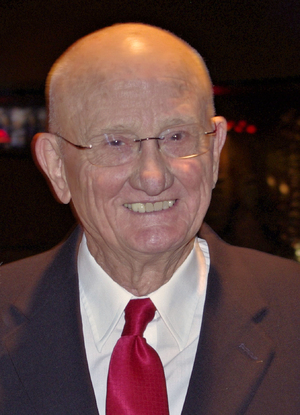 We would like to tell you a little bit about Dad and his life well lived before he moved to this beautiful area. He was an only child, born in the small town of Sewanne Tennessee (population ~2,300) and raised in a nearby town half that size called Monteagle.
We would like to tell you a little bit about Dad and his life well lived before he moved to this beautiful area. He was an only child, born in the small town of Sewanne Tennessee (population ~2,300) and raised in a nearby town half that size called Monteagle. 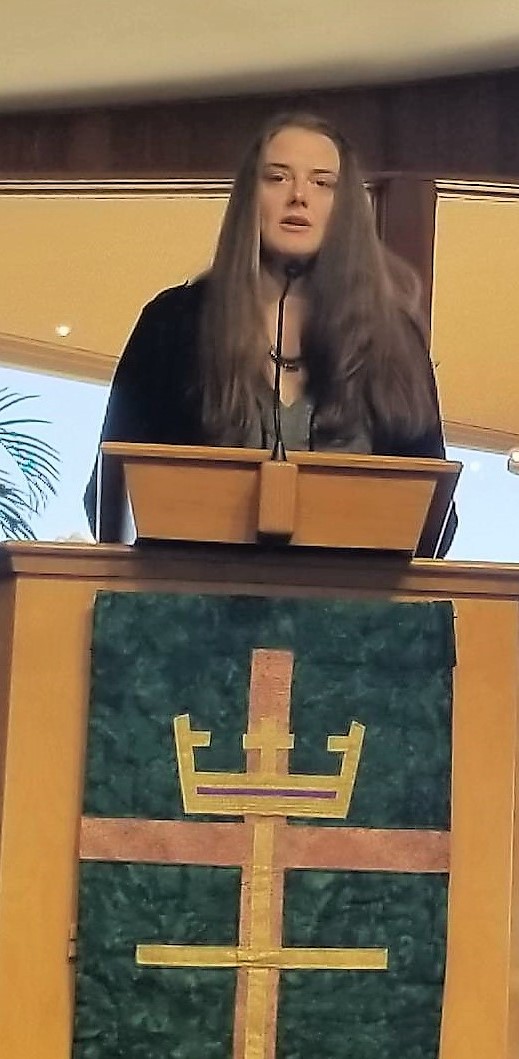 Granddaughter Rachel Ramsey reads 1st Corinthians 13Even though he went out West, you can’t take the South out of a Tennessean as dad once told me he would pack a suitcase full of moonshine when back home in Tennesse to take back on the train for his buddies in Colorado!
Granddaughter Rachel Ramsey reads 1st Corinthians 13Even though he went out West, you can’t take the South out of a Tennessean as dad once told me he would pack a suitcase full of moonshine when back home in Tennesse to take back on the train for his buddies in Colorado! 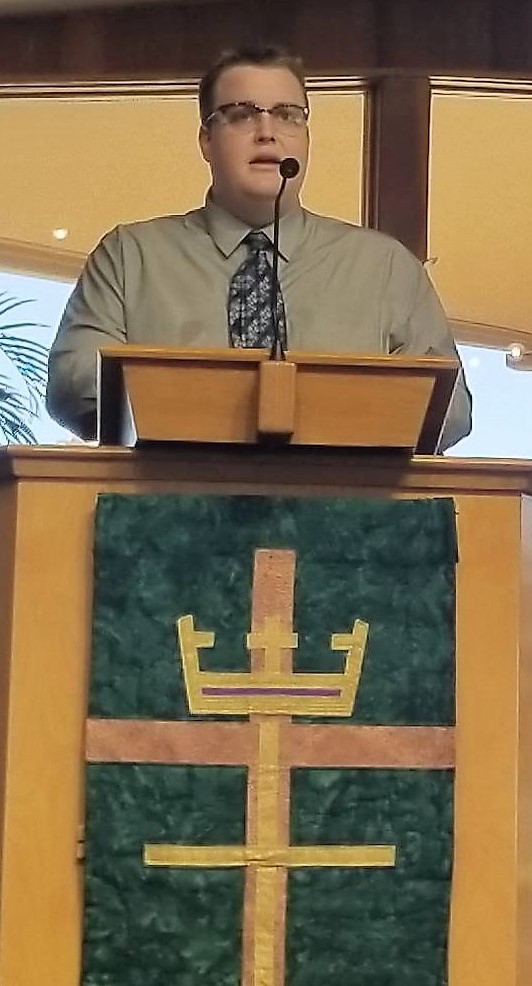 Grandson Robert Ramsey reads Psalm 121The employees because of his management acumen delivered with fairness and respect and employers not only due to his skill as an engineer and manager but also due to his uprightness of character and incorruptibility. I know this, not only because past employees continued to contact him and express their respect, but also because he survived several changes of political climate when he could have been fired for not being a member of the elected party at the time, as well as in later years he was asked to move to a known problem district in order to clean up the corruption within that department.
Grandson Robert Ramsey reads Psalm 121The employees because of his management acumen delivered with fairness and respect and employers not only due to his skill as an engineer and manager but also due to his uprightness of character and incorruptibility. I know this, not only because past employees continued to contact him and express their respect, but also because he survived several changes of political climate when he could have been fired for not being a member of the elected party at the time, as well as in later years he was asked to move to a known problem district in order to clean up the corruption within that department.  Church of the Red Rocks,
Church of the Red Rocks,  Speegle,
Speegle,  eulogy | in
eulogy | in  Family,
Family,  Funeral
Funeral 





